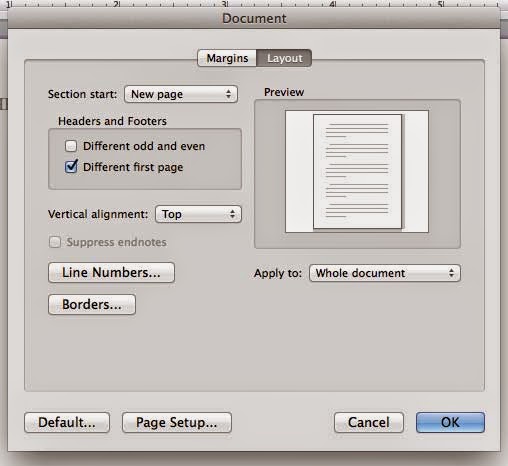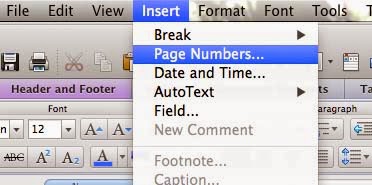Here's one of the most frustrating things about MicroSoft Word. The menu item used to insert a header is under the VIEW menu. Even after years of editing essays, I almost always look for it under the INSERT menu because I'm thinking to myself "I need to insert a running head." Ironically, after the header is created, you merely need to double click on it to edit it, so you don't need to go back to the VIEW menu to edit the header.
Notice that this is called "Header and Footer." The header and footer editing screens are always active at the same time, but you don't need to use footers in APA essays. They are used for other types of documents.
Once you have the header editing screen active, you need to type in the header info. Notice that APA requires the first page (the cover page) to have the header begin with the following phrase in capital letters: RUNNING HEAD. I don't know if they think anyone reading a university level essay might be stupid enough to not know why there is a title above every page of the essay, or if they just want to justify the use of the caps lock key every time someone writes an essay, but I think this looks ugly. I would dispense with this if it were up to me.
The other thing to notice is that the running head is not necessarily the same wording as the title. The running head should be short enough to fit on one line (leaving room for the page number) along with the words RUNNING HEAD. Let's say your essay title is "Sylvia Plath and the tortured genius: modern feminism and the struggle for autonomy in artistic creation." (Apologies to Sylvia Plath scholars, feminists, and artists.) That's way too long to fit on one line at the top of every page. So the running head would look like this: "RUNNING HEAD: Sylvia Plath and artistic creation."
 Only the cover page needs the caps lock RUNNING HEAD. All the other pages in the essay will have the short version of the title (but now it's in ALL CAPS). So you are going to have to insert the header one more time, but before you do that, you need to make sure one thing is set in the document. The formatting of the document needs to be set to have a different first page (the cover page). To do this, access the DOCUMENT formatting window. It's pretty simple. Under the FORMAT menu, select DOCUMENT, and the DOCUMENT window will open. Click on LAYOUT and the the check box on "Different first page." Now the second page in the document will have no header, so you can go to the second page, use the VIEW menu to view the editing screen for the header and footer, and then type in the running head in all caps.
Only the cover page needs the caps lock RUNNING HEAD. All the other pages in the essay will have the short version of the title (but now it's in ALL CAPS). So you are going to have to insert the header one more time, but before you do that, you need to make sure one thing is set in the document. The formatting of the document needs to be set to have a different first page (the cover page). To do this, access the DOCUMENT formatting window. It's pretty simple. Under the FORMAT menu, select DOCUMENT, and the DOCUMENT window will open. Click on LAYOUT and the the check box on "Different first page." Now the second page in the document will have no header, so you can go to the second page, use the VIEW menu to view the editing screen for the header and footer, and then type in the running head in all caps.
But now you need to also insert the page numbers. The headers are conveniently set up with pre-set tabs. As an aside, you should never move characters over by using a bunch of spaces. If you hit repeated spaces to move the page numbers to the right, then the location of the page numbers will be inconsistent depending on the computer of the person viewing the document. In some cases, the page numbers might even jump to a second line on the left. Always use the tab key (on the left side of the keyboard, just above the caps lock key) to move things. And take the time to learn how to set tabs. Depending on how long your running head is, when you hit the tab key, the cursor will jump to the middle of the page, or to the right hand side. If it goes to the middle, then do another tab to get the cursor to the right. Under the INSERT menu, choose PAGE NUMBERS to call up the page number dialogue box. Make sure you have alignment right and show on first page checked, and click OK. You can change the format to Roman numerals, etc, but probably the default is correct. If you have multiple sections on a thesis, then you need to use different formats and start the regular numbers on the first page of the actual content. Now, all you have to do is click the "Close" box on the little line under the header, and every page in your document will be properly formatted with APA headers.



